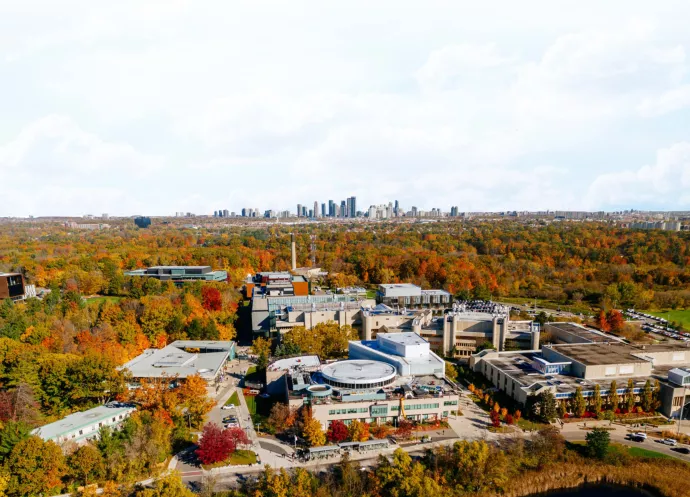This Discussion Paper is also available as a downloadable PDF.

In this Discussion Paper:
Introduction
Throughout May, as many of you know, I hosted a series of community reflection forums, designed to provide a moment to breathe and think, to listen and learn: to consider what the pandemic has shown about our diverse values—and about what UTM does, or could do better, to represent them. Engaging students and staff, faculty and librarians, researchers and postdocs, the forums tried to open another space for people to articulate what matters most to them.
Our discussions raised three recurring themes, none of which had figured as prominently in years past: connection, transparency, and care.
Both rooted in our pandemic context and relevant beyond it, the values speak to experiences of loss, uncertainty, and burnout. Naturally, I don’t presume to fix these experiences, but I do believe that UTM can’t afford to ignore them, especially as we begin a consultative process of strategic planning in the coming months.
The same principle of frank and compassionate recognition applies to the historical and ongoing trauma created by Canadian settler colonialism, most recently brought into focus by the triggering news from Tk’emlúps te Secwépemc territory, where the remains of 215 Indigenous children were discovered on the grounds of Kamloops Residential School. At our final reflection forum on 31 May, co-hosted with Rhonda McEwen, I wanted to sit with this loss both to mourn the children’s deaths and to help frame our discussion of values: to share a sense of what matters most.
The truth matters.
The Canadian system of residential schools took more than 150,000 Indigenous children from their families and strove to destroy their cultures, their languages and their identities. The effects of this system persist today in pervasive structures of inequality and in the intergenerational trauma that many Indigenous families continue to experience.
This truth entails a responsibility to action.
As I noted in my statement for Indigenous History Month, we have an established roadmap for change, with initiatives rooted in the:
- Calls to Justice of the Final Report of the National Inquiry into Missing and Murdered Indigenous Women and Girls
- Calls to Action of U of T’s response to the Truth and Reconciliation Commission: “Answering the Call: Wecheehetowin”
These actions hold central importance to UTM’s processes of self-reflection and long-term planning, three key values for which I share below. But I also want to state plainly the foundation that structures them all: a commitment to the truth that comes before reconciliation and the dedication to act on our promises.
Connection

On 4 May, at our first reflection forum, which I co-hosted with Lorretta Neebar and Fiona Rawle, our students spoke poignantly about the challenges of this past year. They valued the dedicated work of faculty, TAs, staff, and librarians, who had supported their success online, but they also felt a profound sense of loss: loss of opportunities, loss of physical and mental health, loss of relationships and embodied presence. They described UTM’s campus as a web of connections, treasured not only as a site of education but as a place for interaction.
And they missed deeply the chance encounters that this place creates:
- laughing with employees in food services
- bumping into classmates and friends
- pointing lost parents and visitors in the right direction
These experiences entail a lesson. When we do indeed return to campus, we should do so with a full and strategic understanding of the power of this place, intentionally embracing our locations—at UTM, in Mississauga, in Peel—as a web for connections and community building.
Transparency
Many of our faculty and librarians share a similar perspective, often celebrating the campus’s distinct capacity for local engagement and community-based research. At their reflection forum on 12 May, however, faculty and librarians articulated their values in a different way.
They preferred to ask questions, focused on plans for the upcoming year:
- Will U of T mandate vaccinations for COVID-19?
- Will UTM explore a pilot program for rapid antigen testing?
- What options has the university considered for ongoing flexible and remote work?
- How does UTM intend to address the increase in issues of academic integrity?
In each case, with help from my co-hosts Kathi Wilson, Kent Moore, and Shelley Hawrychuk, I could point to work already in progress, led by experts at UTM and across the tri-campus system. But I also realized that this work doesn’t have the same visibility as initiatives already completed and launched—and that many faculty and librarians want to know more about projects as they develop, even before these projects have reached a definite end. They want to know that somebody has started working on an issue—that the university is thinking about the issues that matter to them. UTM can’t dispel all uncertainty. But we can tell you who is working on a question; we can tell you how problems will be solved; we can engage your expertise in solving them. In a word, as my new Focus on Fall series suggests:
We can become more transparent in our campus communications.
Care

The clarity and transparency of our communications will continue to benefit from conversations with UTM staff. In speaking with staff, especially recently, I have listened to an overriding theme. People feel burnt out, in the deep rather than casual sense of the term. Not simply tired or stressed, many of our staff members—and faculty and postdocs and librarians and students, too—balance a high workload with high ideals, applied in a healing or socially oriented context: the textbook conditions of burnout.
The same strain came through at the staff reflection forum on 26 May, which I co-hosted with Saher Fazilat and Mark Overton. We heard plenty of reasons for optimism and celebration, anchored in ideas for local and global engagement. But we also heard a powerful call for more support, both from staff worried about a transition back to campus and from staff who have never left the campus’s front lines. UTM, I hope, will ground this support in what psychiatrist Trevor Young, Dean of U of T’s Faculty of Medicine, calls a culture of care, represented in word and deed.
Part of that commitment means rooting our campus’s strategic plan in realistic, context-specific targets. UTM will continue to pursue outstanding discoveries in faculty and student research; we’ll continue to develop inclusive communities and sustainable spaces; we’ll continue to inspire academic creativity for student success. But our primary goal, I argue, should reflect the challenges and fluidity of our short- and medium-term context: the context is the pandemic and the legacy of post-pandemic trauma and recovery; the goal is to support our community through it safely.
Our existing strategies have made an impactful start. We host a vaccine clinic that has already administered hundreds of thousands of doses of life-saving vaccine. We continue to work closely with leadership at Peel Public Health to limit the number of positive cases connected to campus. And we’ll continue to pursue similar activities going forward, recognizing that the scope and goals of our strategic plan must follow from our work in overcoming the pandemic.
Rather than detracting from a long-term vision, this grounded focus on health and care will provide the foundation to enable our vision’s greater success.
We’ll continue to do brilliantly in teaching and research, in inclusion and sustainability, in community engagement and student support. But we’ll do even better if we build our brilliance on a basis of wellbeing.
Alexandra Gillespie, Vice-President & Principal
University of Toronto Mississauga
June 16, 2021
